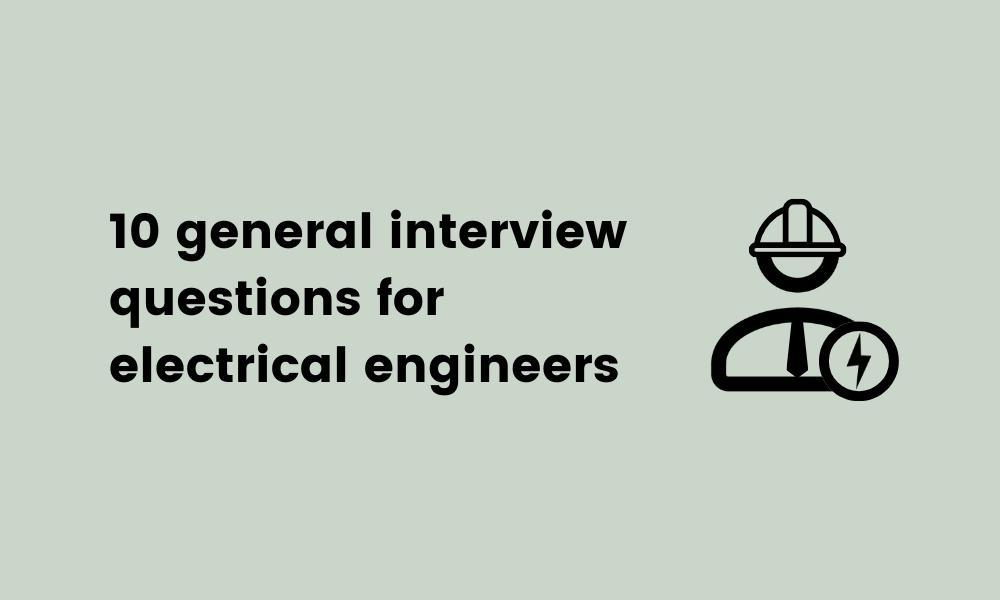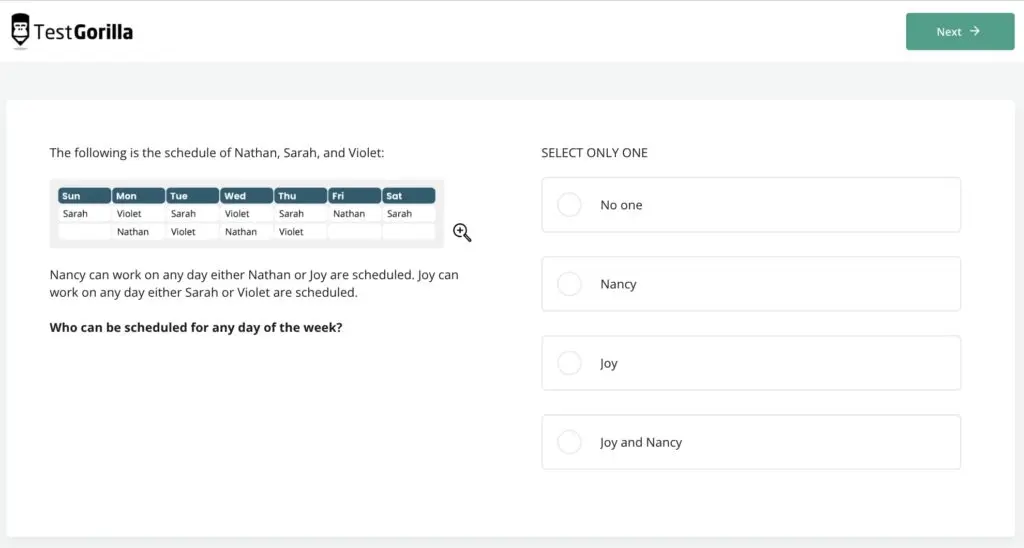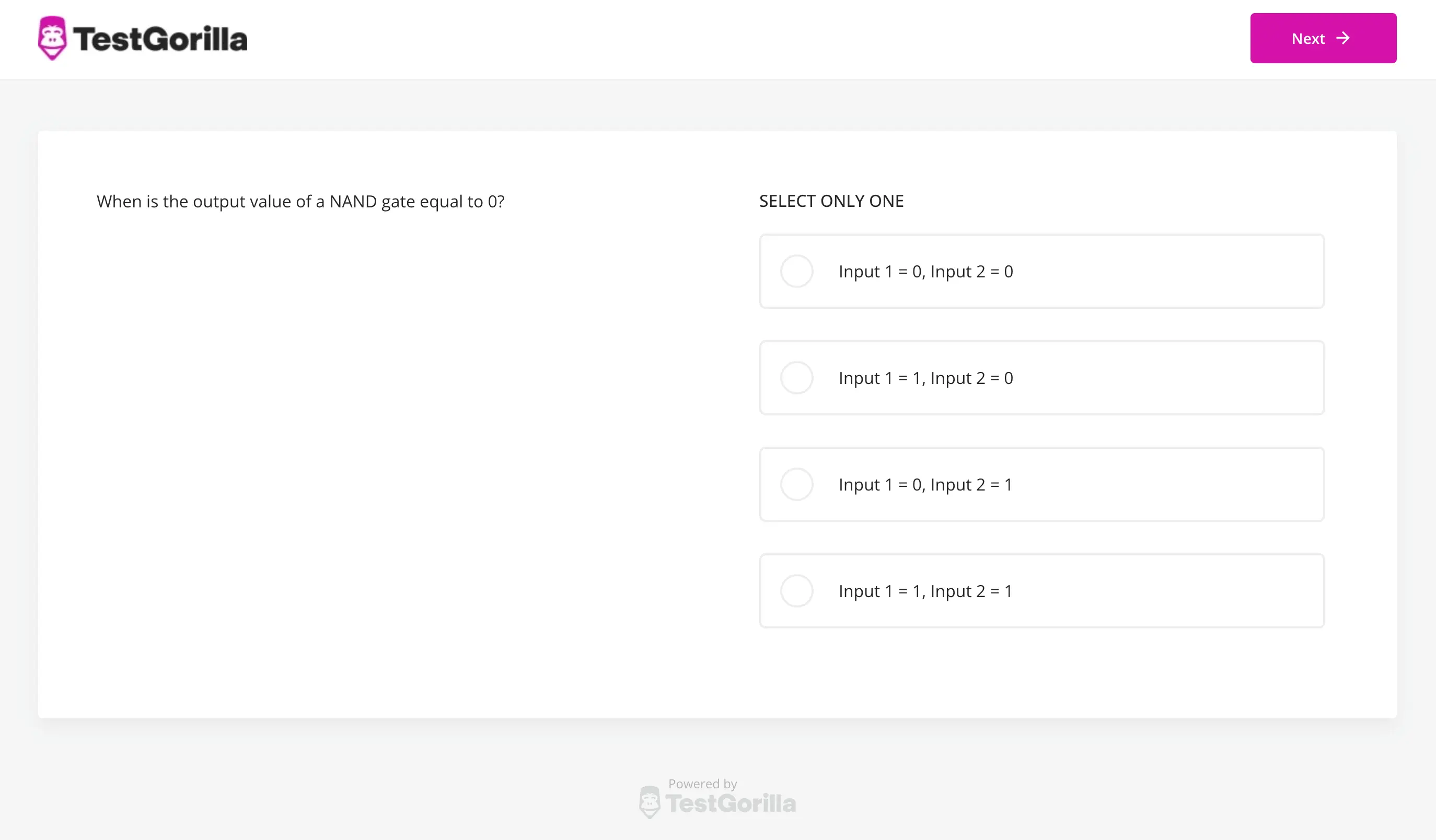73 interview questions for electrical engineers to hire skilled professionals
Upgrade your team — find your next great hire with TestGorilla
Finding the right expert with in-depth knowledge of electricity and circuits for your business isn’t easy. Have they got experience with AC circuits? Do they know the difference between a series and a parallel circuit?
There are so many factors to keep in mind when reviewing their skills.
But there are a two main ways to figure out if their knowledge is sufficient for the role you’re looking to fill:
Use our Fundamentals of Electricity test to see if they know all the basics
Interview them by using the right interview questions for an in-depth assessment of their skills
Using these two approaches can help you find an expert easily.
Below, we’ve provided 73 interview questions to help you prepare for interviewing your candidates. All the questions you need are here – along with some sample answers to review applicants’ responses.
Table of contents
- 10 general interview questions for electrical engineers
- 5 general interview questions and answers to assess electrical engineers
- 49 interview questions for electrical engineers related to technical definitions
- 7 electrical engineering interview questions and answers related to technical definitions
- 14 situational interview questions for electrical engineers
- 5 situational interview questions and answers to assess electrical engineers
- At what stage of the hiring process should you use these interview questions for electrical engineers?
- Hire an expert using our job interview questions for electrical engineers
10 general interview questions for electrical engineers
Here are 10 general interview questions for electrical engineers you can ask candidates at the beginning of the interview. These questions will enable you to learn about your applicants’ overall knowledge and experience.
Define electrical engineering and explain its applications
List three critical responsibilities of electrical engineers
List three essential skills for electrical engineers
What made you choose a career in electrical engineering?
Name the vital components of an electrical circuit
Name three cable types electricians use for transmissions
Name your best technical skills as an electrical engineer
Name a technical skill you’re trying to perfect as an electrical engineer
Have you studied for an electrical engineering degree or course?
Name a soft skill you’re trying to perfect as an electrical engineer
Discover a better way to assess soft skills in electrical engineers
Choose from our 400+ candidate-friendly skills and personality tests for fast and accurate pre-employment screening.
5 general interview questions and answers to assess electrical engineers
This section has a selection of the five most important general interview questions for electrical engineers, along with their sample answers. Check the answers and use them as a guide to assess your applicants’ responses.
1. Name a soft skill you’re trying to perfect as an electrical engineer
Electrical engineers should always ensure they’re working on improving their skills, including soft skills.
For instance, they may want to enhance their communication skills or time-management abilities to interact with clients efficiently, which is a sign of professionalism and essential development. Check with your applicants what they do specifically to improve the skills they mention.
2. Name a technical skill you’re trying to perfect as an electrical engineer
Applicants must work toward mastering their technical skills to perform professionally at every job.
For example, they may need to perfect their health and safety knowledge or refresh their knowledge of the fundamentals of electrical engineering. Ensure your interviewees are taking the correct steps to master these skills, such as taking a course or taking on tasks that enable them to gain the experience they need.
3. Name the critical components of an electrical circuit
Skilled electrical engineers should know the critical components of an electrical circuit. Listen for answers that mention the following elements:
Parallel circuits are circuits with components connected in parallel
Series circuits are circuits with components connected in series
AC circuits are circuits that have alternating current
DC circuits are circuits that have direct current
Active circuits are circuits that generate energy from electricity passing through them
Passive circuits are circuits that don’t generate energy from electricity passing through them
4. Define electrical engineering and explain its applications
Electrical engineers who want to join your organization should know that electrical engineering deals with electrical circuits, the application of electrical elements and electricity, and electromagnetism.
Interviewees should know that the field deals with alternating current, high voltage, and current in different industries.
5. List three critical responsibilities of electrical engineers
Some of the critical electrical engineering responsibilities your applicants may mention when responding to this interview question include to:
Solve electrical problems in electronic devices
Complete tests to check the functionality of electric systems
Design power grids for different uses and applications
The best insights on HR and recruitment, delivered to your inbox.
Biweekly updates. No spam. Unsubscribe any time.
49 interview questions for electrical engineers related to technical definitions
Here are 49 job interview questions for electrical engineers about technical definitions. You can ask your candidates some of these questions to learn about their expertise with circuits and components.
Explain what electrical power systems are
Explain what electrical control systems are
What are digital circuits?
What is an AC motor?
Can you explain what a DC motor is?
Can you explain what an AC generator is?
What is a DC generator?
What is an active circuit?
Explain what a passive circuit is
Describe the difference between an AC and a DC.
Explain what a series circuit is
Explain what a parallel circuit is
Describe the difference between a series and a parallel circuit
Explain what capacitance means
Explain what inductance means
Describe the difference between capacitance and inductance
Define what a capacitor is
Explain what a resistor is
Define what an inductor is
Explain what an ideal transformer is
What is an active network?
What is a passive network?
Explain the functions of each wire in an electric circuit and how to distinguish between them
Explain which elements make up a transistor
Explain what a voltmeter is
Explain what an ammeter is
Explain what an Ohmmeter is
Explain what a cathode ray oscilloscope is
What is a wattmeter?
What is a power meter?
Explain what an open-loop control system is
Explain what a closed-loop control system is
Explain the difference between open-loop and closed-loop control systems
Define what RLC current refers to
Explain what a transformer is
Define what an alternator is
Explain what a generator is
Explain and differentiate between an alternator and a generator
Explain what an intrinsic semiconductor is
Explain what an extrinsic semiconductor is
Explain what a laser diode is and when you would use one
Define FPGA and why it’s essential
Explain what a two-phase motor is
Define what a rectifier is
What is a half-wave rectifier?
What is a full-wave rectifier?
Explain what an analog circuit is
Explain what a digital circuit is
Define AVR and explain why it’s essential for electrical engineering
7 electrical engineering interview questions and answers related to technical definitions
In this section, you’ll find seven electrical engineering interview questions and answers related to technical definitions. See our sample answers below and use them to guide you when reviewing your candidates’ responses.
1. Explain which elements make up a transistor
Experts in the field of electrical engineering should know that two key elements make up a transistor. Can they explain that n-type semiconductors and p-type semiconductors are the essential elements of transistors and outline the differences between the two?
2. Explain what an ideal transformer is
Candidates may refer to input and output authority when explaining what an ideal transformer is. They may explain that a transformer is an “ideal” transformer when the output authority equals the input authority.
Another phrase you should listen for when you ask interviewees this question is “100% competence”, which is another term that describes the lack of power loss in an ideal transformer.
3. Explain what a capacitor is
Do your interviewees know that a capacitor is a component that resists or opposes the current’s flow? Can they explain that capacitors also store a certain amount of electrical charge when engineers apply a potential?
4. What is a resistor?
Candidates familiar with electrical components should know that a resistor opposes a current’s flow. They may also know that this electrical component has two terminals and that electrical engineers use them to reduce or limit a current’s flow.
5. Define what an inductor is
Knowledgeable applicants will know that an inductor is a component that electrical engineers use to build an electrical circuit. They should know that an inductor also forms a choke or coil, which engineers use to store energy as part of a magnetic field.
6. Explain what capacitance means
Do your interviewees know that capacitance refers to a capacitor’s charge? They may also know that this word can refer to the process where a system stores electrical charges and that the symbol that represents capacitance is the capital letter C.
7. Explain what inductance means
When a coil resists changes in an electric current that flows through it, this process is known as inductance. Skilled electrical engineers may also explain that inductance describes the ratio that compares the induced voltage to the current’s rate of change and that the symbol representing inductance is a capital letter L.
14 situational interview questions for electrical engineers
Ask your interviewees some of these 14 job interview questions for electrical engineers to assess their skills and learn how they handle challenging situations at the job.
If you put two positively charged items together, what would happen?
What action would you take if you noticed reverse polarity occurring?
How would your coworkers rate your communication skills?
Why is critical thinking fundamental for electrical engineers?
How would you connect a tube light circuit?
In which situation would you use a thyristor?
How would you rate your safety skills and knowledge?
How would you rate your electronic circuits knowledge?
Which criteria should you use when choosing a wire?
In which situation would you use an ASCR cable?
How would your coworkers rate your problem-solving skills?
How would your coworkers rate your time-management skills?
In which situation would you use a transformer?
In which situation would you use a transistor?
5 situational interview questions and answers to assess electrical engineers
Here are five situational interview questions for electrical engineers, along with their sample answers. Use them to gauge your applicants’ responses and see who has the skills you need.
1. How would your coworkers rate your problem-solving skills?
Since problem-solving skills are critical for electrical engineers, ask applicants this interview question to determine whether their skills meet your expectations.
Applicants should be able to provide an example of when they have used problem solving to handle a task, such as electrical troubleshooting work. Consider our Problem-Solving skills test if you need to review applicants’ problem-solving skills in more depth.
2. If you put two positively charged items together, what would happen?
Since charges are essential in the context of electromagnetism, applicants should know that two positively charged items would repel each other. They may also mention that the items will move apart and compare this with two opposite charges, in which case the items would move closer.
3. Which criteria should you use when choosing a wire?
The most important criteria electrical engineers may mention when responding to this interview question include:
Wire capacity
Wire size
Wire gauge
Current flow
4. In which situation would you use a thyristor?
There are several situations when electrical engineers may choose to use a thyristor.
For instance, a thyristor is an excellent choice if they want to reduce the cost of speed-control or control-alternating currents. Candidates may also explain that they could use thyristors in high-current and high-voltage applications.
5. What action would you take if you noticed reverse polarity occurring?
Do your applicants know that fixing reverse polarity involves checking the outlet’s connection and the receptacle? Can they explain that swapping white and black wires can resolve the issue?
At what stage of the hiring process should you use these interview questions for electrical engineers?
The best time to use these interview questions is after you’ve administered a skills assessment. A skills assessment can feature up to five tests for role-specific skills (such as our Fundamentals of Electricity test) and cognitive abilities – and you can even include personality tests.
To simplify your recruitment process and make it more objective, here are the steps you should follow:
Write a detailed job description and post an ad on relevant sites
Source candidates and receive their applications
Build a skills assessment that features up to five skills tests
Ask all applicants to complete the assessment
Check the assessment results
Invite top performers to an interview
Use our interview questions above to get a deeper understanding of your applicants’ skills
Ask follow-up questions as needed
Shortlist applicants based on the skills-assessment and interview results
Extend an offer to the best applicant
Complete your onboarding using what you’ve learned about your new hire’s skills and provide targeted training
With these steps, you’ll have no problem finding, assessing, hiring, and onboarding the most skilled electrical engineers. Remember that you can also use skills tests once you’ve hired an applicant to see how they’re progressing and if they need additional support for any specific area.
Hire an expert using our job interview questions for electrical engineers
That’s all there is to it! Hiring an electrical engineer doesn’t have to be difficult. All you have to do is create the right list of job interview questions for electrical engineers – and in this article, you’ve got a list of the best 73 questions to help you.
Before you interview applicants, however, make sure you use our Fundamentals of Electricity skills test (sample question below). This will enable you to hire without bias and effortlessly compare applicants to see who truly has what it takes to succeed at your open role.
Find and hire the best electrical engineers for your business with TestGorilla’s skills assessments and the questions from this article – this way, you can’t go wrong!
You've scrolled this far
Why not try TestGorilla for free, and see what happens when you put skills first.





















